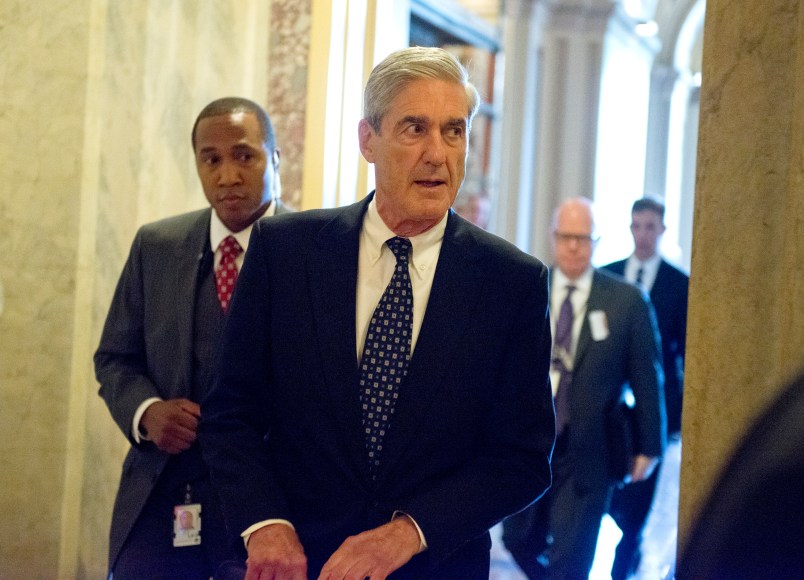Special Counsel Robert Mueller in mid-October subpoenaed President Trump’s campaign for documents containing Russia-related key words, the Wall Street Journal reported and other outlets since have confirmed.
A source told CNN they were a matter of “bookkeeping” and “largely perfunctory,” while other outlets also reported them as being described by sources as routine.
Yet, the subpoenas came in a stretch of the Mueller investigation when we now know the special counsel was interviewing top campaign officials and preparing a major release of court filings that would send ripples throughout Washington.
Given how flat-footed Trump world was caught by the revelation on Oct. 30 that a campaign foreign policy adviser had pleaded guilty in Mueller’s investigation, it’s easy to imagine that when the campaign subpoenas were issued, the officials were unaware of the Oct. 5 plea agreement by George Papadopoulos.
Many of the events that made up what appears to have been a busy October for Mueller’s team are now just becoming known, due to media reports as well as the court documents that were unsealed late in the month. What revelations the activity produced for Mueller is still an open question.
Not long before the subpoenas were reportedly issued for more than a dozen campaign officials, Mueller’s team was wrapping up the case it had brought against Papadopoulos, a campaign foreign policy advisor who admitted he lied to the FBI about his Russian contacts during the campaign, according to court documents.
Prosecutors arrested Papadopoulos in July, and one of the conditions of his release barred him from speaking to members of the campaign—especially those mentioned in the charging documents against him. Prosecutors also successfully sought to put the case under seal.
At the time of plea deal Papadopoulos made with Mueller’s team after months of cooperation, prosecutors asked that his plea remain under seal. An Oct. 3 motion said “public disclosure” of Papadopoulos’ arrest and charges may make “potential targets … reticent to speak with investigators or modify the statements they make to investigators.”
“There are, as we put in the motion, certain aspects of the ongoing investigation that we believe and we submitted to the Court at this time give reason for sealing,” Andrew Goldstein, an attorney for the special counsel, told a judge at a hearing on the plea deal two days later. “When those reasons don’t exist anymore — and we believe that it will be in the near term, that we will immediately alert the Court and ask for the proceedings to be unsealed.”
That unsealing happened little more than three weeks later, on Oct. 30, the same day the Mueller team released the indictment it had brought against former Trump campaign chair Paul Manafort and his longtime business partner Rick Gates. (Both have pleaded not guilty to the charges of money laundering, tax evasion and failure to disclose foreign lobbying).
So what happened in between?
The recent reports place the subpoenas on the campaign in this time period, though the campaign had already been voluntarily handing documents over to Mueller in the months prior.
At least one of the former campaign officials referenced in the Papadopoulos filings was roped directly into the investigation. Sam Clovis — referred to as the “campaign supervisor” in the Papadopoulos documents — spoke to Mueller’s team and testified in front of the grand jury overseeing the investigation at some point during the week of Oct. 23, NBC News reported.
It appears that other former campaign officials referred to in the charging documents against Papadopoulos have also now spoken to Mueller’s team, though the timing and extent of those conversations is unclear.
Stephen Miller — a top White House official who is referred to as “senior policy adviser” in the Papadopoulos documents — has spoken to Mueller’s team, per a Nov. 9 CNN report. Miller was listed in emails referenced in the court filings.
Retired Lt. Gen. Keith Kellogg, who was was on the same foreign policy team as Papadopoulos, had spoke with Mueller by late September, according to a Sept. 29 Fox News story.
In early November, the New York Times reported that Carter Page, another campaign foreign policy adviser, had been brought in front of Mueller’s grand jury.
Page, who has admitted to having been included on some emails with Papadopoulos, has refused to confirm to TPM what sort of interactions he’s had with the special counsel’s probe, though he’s acknowledged them in comments elsewhere.
He says Mueller team has been more professional than Congress and HPSCI had been more professional than SSCI.
— Katie Bo Williams (@KatieBoWill) November 16, 2017
Mueller’s team has continued to charge ahead, with White House communications director Hope Hicks — who was on emails with Papadopoulos — and other top Trump aides slated to have completed their Mueller interviews by “shortly after Thanksgiving,” as White House attorney Ty Cobb told Politico.







I’m so excited! I want more details! More! Gimme!!!
Go Tierney!
Seriously, you don’t get this stuff anywhere else.
We’re about due for another bombshell report. Mueller’s probably burning the midnight oil knowing each additional day Trump is President is another day of danger for our national security.
Oh I think Mueller been busy the whole time, but has managed to keep the whole thing under wraps, more to come.
One can only admire the professionalism, thoroughness, and stealth of Mueller.